最新高中英语必修一第一单元重点词汇及语法
- 格式:doc
- 大小:28.00 KB
- 文档页数:3
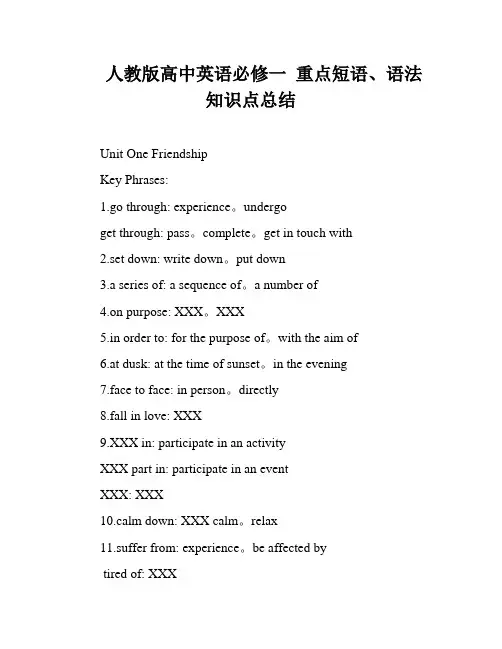
人教版高中英语必修一重点短语、语法知识点总结Unit One FriendshipKey Phrases:1.go through: experience。
undergoget through: pass。
complete。
get in touch with2.set down: write down。
put down3.a series of: a sequence of。
a number of4.on purpose: XXX。
XXX5.in order to: for the purpose of。
with the aim of6.at dusk: at the time of sunset。
in the evening7.face to face: in person。
directly8.fall in love: XXX9.XXX in: participate in an activityXXX part in: participate in an eventXXX: XXX10.calm down: XXX calm。
relax11.suffer from: experience。
be affected bytired of: XXX13.be concerned about: care about。
worry about14.get on/along well with: have a good nship with15.be good at/do well in: be skilled at。
excel in16.find it + adj。
to do sth.: consider doing something to be。
17.XXX: not anymore18.too much: an excessive amount (used with uncountable nouns)much too: excessively (used with adjectives)19.not…until: only after。
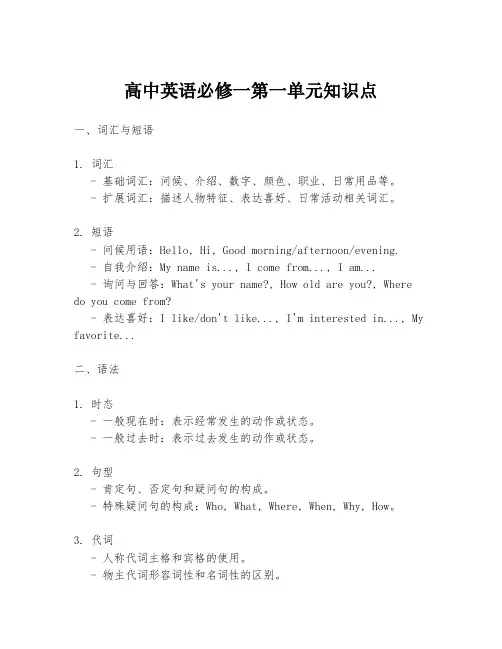
高中英语必修一第一单元知识点一、词汇与短语1. 词汇- 基础词汇:问候、介绍、数字、颜色、职业、日常用品等。
- 扩展词汇:描述人物特征、表达喜好、日常活动相关词汇。
2. 短语- 问候用语:Hello, Hi, Good morning/afternoon/evening.- 自我介绍:My name is..., I come from..., I am...- 询问与回答:What's your name?, How old are you?, Where do you come from?- 表达喜好:I like/don't like..., I'm interested in..., My favorite...二、语法1. 时态- 一般现在时:表示经常发生的动作或状态。
- 一般过去时:表示过去发生的动作或状态。
2. 句型- 肯定句、否定句和疑问句的构成。
- 特殊疑问句的构成:Who, What, Where, When, Why, How。
3. 代词- 人称代词主格和宾格的使用。
- 物主代词形容词性和名词性的区别。
4. 介词- 常用介词:in, on, at, for, with, by, of, about, from, to, from...to...三、听力与口语1. 听力- 理解日常对话和短文。
- 抓住关键信息,如人名、地点、时间和数字。
2. 口语- 进行简单的自我介绍和日常对话。
- 描述人物和事物,表达个人意见和喜好。
四、阅读与写作1. 阅读- 阅读并理解简短的文章和对话。
- 通过上下文猜测生词的意思。
2. 写作- 写简短的自我介绍。
- 描述人物、地点或事件。
五、文化知识1. 了解英语国家的基本文化习俗。
2. 学习与日常生活相关的英语国家节日和传统。
六、学习策略1. 制定学习计划,合理安排学习时间。
2. 利用多种资源和工具辅助学习,如词典、录音和在线资源。
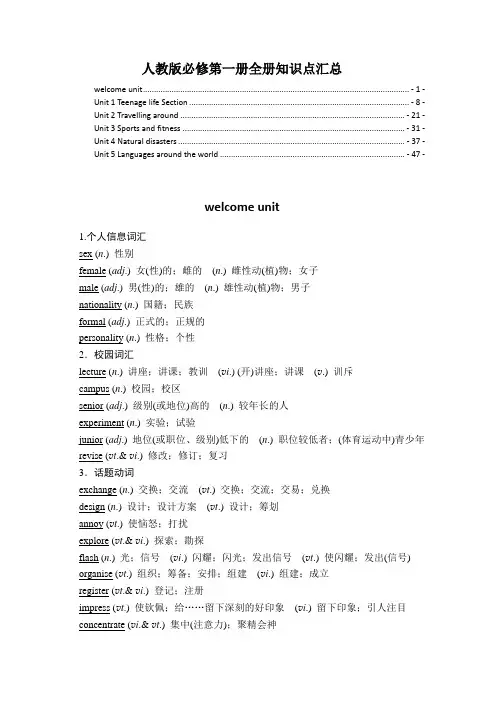
人教版必修第一册全册知识点汇总welcome unit ......................................................................................................................... - 1 - Unit 1 Teenage life Section .................................................................................................... - 8 - Unit 2 Travelling around ...................................................................................................... - 21 - Unit 3 Sports and fitness ..................................................................................................... - 31 - Unit 4 Natural disasters ....................................................................................................... - 37 - Unit 5 Languages around the world .................................................................................... - 47 -welcome unit1.个人信息词汇sex (n.) 性别female (adj.) 女(性)的;雌的(n.) 雌性动(植)物;女子male (adj.) 男(性)的;雄的(n.) 雄性动(植)物;男子nationality (n.) 国籍;民族formal (adj.) 正式的;正规的personality (n.) 性格;个性2.校园词汇lecture (n.) 讲座;讲课;教训(v i.) (开)讲座;讲课(v.) 训斥campus (n.) 校园;校区senior (adj.) 级别(或地位)高的(n.) 较年长的人experiment (n.) 实验;试验junior (adj.) 地位(或职位、级别)低下的(n.) 职位较低者;(体育运动中)青少年revise (v t.& v i.) 修改;修订;复习3.话题动词exchange (n.) 交换;交流(v t.) 交换;交流;交易;兑换design (n.) 设计;设计方案(v t.) 设计;筹划annoy (v t.) 使恼怒;打扰explore (v t.& v i.) 探索;勘探flash (n.) 光;信号(v i.) 闪耀;闪光;发出信号(v t.) 使闪耀;发出(信号) organise (v t.) 组织;筹备;安排;组建(v i.) 组建;成立register (v t.& v i.) 登记;注册impress (v t.) 使钦佩;给……留下深刻的好印象(v i.) 留下印象;引人注目concentrate (v i.& v t.) 集中(注意力);聚精会神improve (v i.& v t.) 改进;改善4.话题描述性词汇anxious (adj.) 焦虑的;不安的annoyed (adj.) 恼怒的;生气的frightened (adj.) 惊吓的;害怕的outgoing (adj.) 爱交际的;外向的awkward (adj.) 令人尴尬的;难对付的confident (adj.) 自信的;有把握的curious (adj.) 好奇的;求知欲强的forward (ad v.) (also forwards) 向前;前进(adj.) 向前的;前进的5.话题名词registration (n.) 登记;注册;挂号nation (n.) 国家;民族;国民designer (n.) 设计者impression (n.) 印象;感想confidence (n.) 信心;信任guy (n.) 小伙子;男人;家伙organisation (n.) 组织;团体;机构goal (n.) 目标;球门;射门strategy (n.) 策略;策划partner (n.) 同伴;配偶;合伙人company (n.) 公司;商行;陪伴style (n.) 方式;作风6.话题短语senior_high_school 〈美〉高中at_last 终于;最终make_an_impression 留下好印象what_if 要是……会怎么样呢concentrate_on 集中精力于leave ... alone 不打扰;不惊动junior_high_school 〈美〉初级中学look_forward_to 盼望,期待take_notes 记笔记flash_card 教学卡片;识字卡重点知识合作探究Our school invited two engineers to design_a_language_lab_for_us.我们学校邀请了两位工程师为我们设计一个语言实验室。
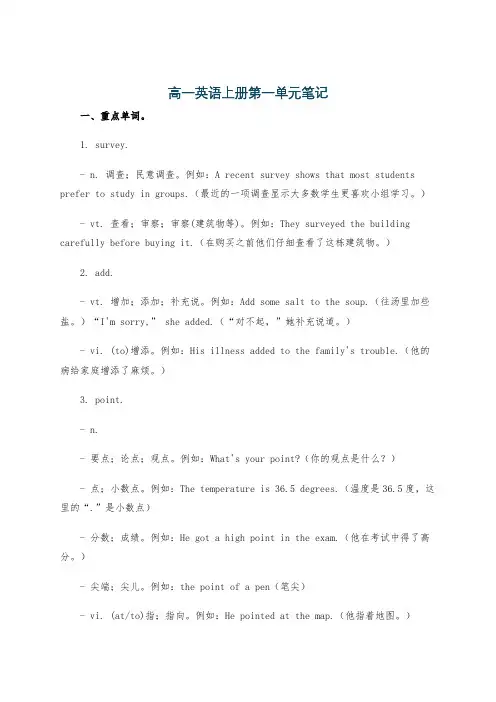
高一英语上册第一单元笔记一、重点单词。
1. survey.- n. 调查;民意调查。
例如:A recent survey shows that most students prefer to study in groups.(最近的一项调查显示大多数学生更喜欢小组学习。
)- vt. 查看;审察;审察(建筑物等)。
例如:They surveyed the building carefully before buying it.(在购买之前他们仔细查看了这栋建筑物。
)2. add.- vt. 增加;添加;补充说。
例如:Add some salt to the soup.(往汤里加些盐。
)“I'm sorry,” she added.(“对不起,”她补充说道。
)- vi. (to)增添。
例如:His illness added to the family's trouble.(他的病给家庭增添了麻烦。
)3. point.- n.- 要点;论点;观点。
例如:What's your point?(你的观点是什么?)- 点;小数点。
例如:The temperature is 36.5 degrees.(温度是36.5度,这里的“.”是小数点)- 分数;成绩。
例如:He got a high point in the exam.(他在考试中得了高分。
)- 尖端;尖儿。
例如:the point of a pen(笔尖)- vi. (at/to)指;指向。
例如:He pointed at the map.(他指着地图。
)- vt. 指出。
例如:The teacher pointed out my mistakes.(老师指出了我的错误。
)4. upset.- adj. 心烦意乱的;不安的;不适的。
例如:She was upset about losing her wallet.(她因为丢了钱包而心烦意乱。
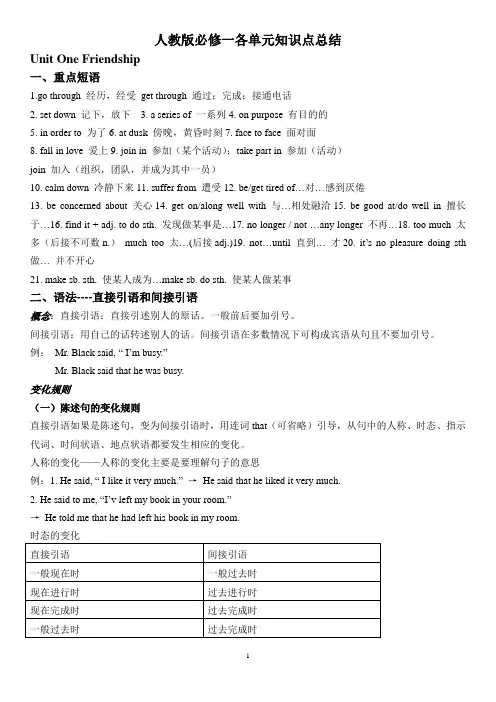
人教版必修一各单元知识点总结Unit One Friendship一、重点短语1.go through 经历,经受get through 通过;完成;接通电话2. set down 记下,放下3. a series of 一系列4. on purpose 有目的的5. in order to 为了6. at dusk 傍晚,黄昏时刻7. face to face 面对面8. fall in love 爱上9. join in 参加(某个活动);take part in 参加(活动)join 加入(组织,团队,并成为其中一员)10. calm down 冷静下来11. suffer from 遭受12. be/get tired of…对…感到厌倦13. be concerned about 关心14. get on/along well with 与…相处融洽15. be good at/do well in 擅长于…16. find it + adj. to do sth. 发现做某事是…17. no longer / not …any longer 不再…18. too much 太多(后接不可数n.)much too 太…(后接adj.)19. not…until 直到…才20. it’s no pleasure doing sth 做…并不开心21. make sb. sth. 使某人成为…make sb. do sth. 使某人做某事二、语法----直接引语和间接引语概念:直接引语:直接引述别人的原话。
一般前后要加引号。
间接引语:用自己的话转述别人的话。
间接引语在多数情况下可构成宾语从句且不要加引号。
例:Mr. Black said, “ I’m busy.”Mr. Black said that he was busy.变化规则(一)陈述句的变化规则直接引语如果是陈述句,变为间接引语时,用连词that(可省略)引导,从句中的人称、时态、指示代词、时间状语、地点状语都要发生相应的变化。
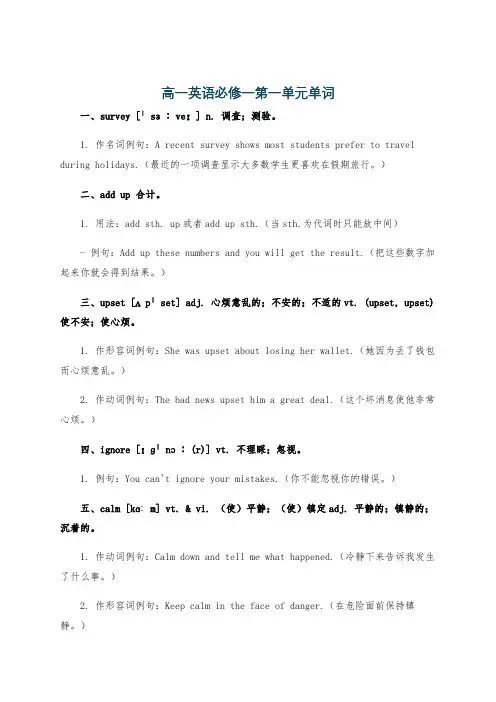
高一英语必修一第一单元单词一、survey [ˈsɜːveɪ] n. 调查;测验。
1. 作名词例句:A recent survey shows most students prefer to travel during holidays.(最近的一项调查显示大多数学生更喜欢在假期旅行。
)二、add up 合计。
1. 用法:add sth. up或者add up sth.(当sth.为代词时只能放中间)- 例句:Add up these numbers and you will get the result.(把这些数字加起来你就会得到结果。
)三、upset [ʌpˈset] adj. 心烦意乱的;不安的;不适的vt. (upset, upset) 使不安;使心烦。
1. 作形容词例句:She was upset about losing her wallet.(她因为丢了钱包而心烦意乱。
)2. 作动词例句:The bad news upset him a great deal.(这个坏消息使他非常心烦。
)四、ignore [ɪɡˈnɔː(r)] vt. 不理睬;忽视。
1. 例句:You can't ignore your mistakes.(你不能忽视你的错误。
)五、calm [kɑːm] vt. & vi. (使)平静;(使)镇定adj. 平静的;镇静的;沉着的。
1. 作动词例句:Calm down and tell me what happened.(冷静下来告诉我发生了什么事。
)2. 作形容词例句:Keep calm in the face of danger.(在危险面前保持镇静。
)六、calm(…)down (使)平静下来;(使)镇定下来。
1. 例句:The mother tried to calm her crying baby down.(母亲试图使她哭泣的婴儿平静下来。
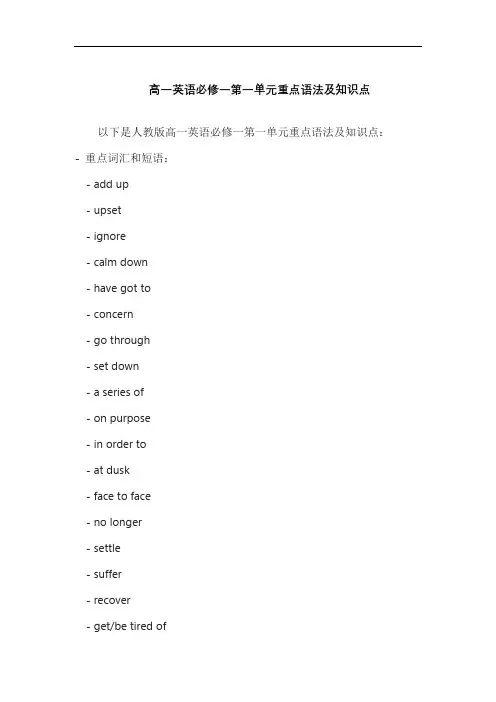
高一英语必修一第一单元重点语法及知识点以下是人教版高一英语必修一第一单元重点语法及知识点:- 重点词汇和短语:- add up- upset- ignore- calm down- have got to- concern- go through- set down- a series of- on purpose- in order to- at dusk- face to face- no longer- settle- suffer- recover- get/be tired of- pack- get along with- fall in love- disagree- join in- 重点句型:- It was the first time in a year and a half that I had seen the night face to face.- I wonder if it’s because I haven’t been able to be outdoors for so long that I’ve grown so crazy about everything to do with nature.- I stayed awake on purpose until half past eleven one evening in order to have a good look at the moon for once by myself.- If you have some trouble getting along with your friends, you can write to the editor and ask for advice.- Add up your score and see how many points you can get.- What he did has added to our difficulties.- His income adds up to $1000 a month.- It' s no pleasure looking through these any longer because nature is one thing that really must be experienced.- Why is she so concerned about his attitude to her work?- The police asked him to set down what he had seen in a report.- As I was about to go out and search for him, he happened to come in.- Mr. Jones lives alone and often feels lonely.- We tried to calm him down, but he kept crying.- Does he dare (to) go out at night in such stormy weather?- He would go through fire and water for his country.- That country suffered a heavy loss in the flood.- 语法总结:- 直接引语和间接引语(一)- 直接引语:直接引述别人的原话。
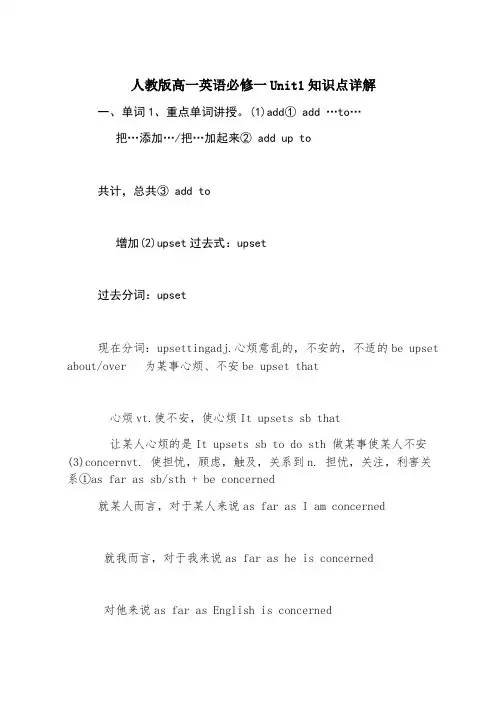
人教版高一英语必修一Unit1知识点详解一、单词1、重点单词讲授。
(1)add① add …to…把…添加…/把…加起来② add up to共计,总共③ add to增加(2)upset过去式:upset过去分词:upset现在分词:upsettingadj.心烦意乱的,不安的,不适的be upset about/over 为某事心烦、不安be upset that心烦vt.使不安,使心烦It upsets sb that让某人心烦的是It upsets sb to do sth 做某事使某人不安(3)concernvt. 使担忧,顾虑,触及,关系到n. 担忧,关注,利害关系①as far as sb/sth + be concerned就某人而言,对于某人来说as far as I am concerned就我而言,对于我来说as far as he is concerned对他来说as far as English is concerned关于英语,对于英语②be concerned about/f or关心,挂念have no concerned about/for③be concernedin/with触及到,与…有关have no concerned in/with(4)go through①经历,遭受,忍受go through one difficulty after another.经历一个又一个困难。
②仔细检查,审查go through your paper 检查你的试卷。
③浏览,翻阅go through all the related reference.浏览相干资料。
④通过,穿过=pass throughgo through a great forest.穿过一片大森林。
⑤完成go through the task.完成任务。
(5)suffer①suffer 作“遭受”时,后面直接接pain, loss, injury, harm或punishment.②suffer 作“受…苦”时,常常搭配:sufferfrom(6)get/be tired of厌烦…get/be/feel tired of sb / sth / doing sth 厌烦be tired from由于…而疲劳(体力上的疲劳),侧重原因be tired out精疲力竭的(7)join in 参加,加入区分join ,join in ,attend 与 take part in:join:多指加入组织,团体,党派等,有作为其中一员的意思。
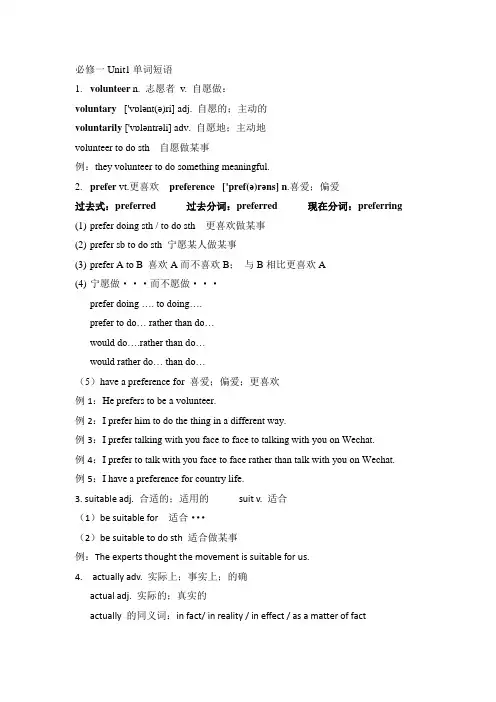
必修一Unit1单词短语1.volunteer n. 志愿者v. 自愿做:voluntary ['vɒlənt(ə)ri] adj. 自愿的;主动的voluntarily ['vɒləntrəli] adv. 自愿地;主动地volunteer to do sth 自愿做某事例:they volunteer to do something meaningful.2.prefer vt.更喜欢preference ['pref(ə)rəns] n.喜爱;偏爱过去式:preferred 过去分词:preferred 现在分词:preferring(1)prefer doing sth / to do sth 更喜欢做某事(2)prefer sb to do sth 宁愿某人做某事(3)prefer A to B 喜欢A而不喜欢B;与B相比更喜欢A(4)宁愿做···而不愿做···pre fer doing …. to doing….p refer to do… rather than do…w ould do….rather than do…w ould rather do… than do…(5)have a preference for 喜爱;偏爱;更喜欢例1:He prefers to be a volunteer.例2:I prefer him to do the thing in a different way.例3:I prefer talking with you face to face to talking with you on Wechat.例4:I prefer to talk with you face to face rather than talk with you on Wechat. 例5:I have a preference for country life.3. suitable adj. 合适的;适用的suit v. 适合(1)be suitable for 适合···(2)be suitable to do sth 适合做某事例:The experts thought the movement is suitable for us.4. actually adv. 实际上;事实上;的确actual adj. 实际的;真实的actually 的同义词:in fact/ in reality / in effect / as a matter of fact5. challenge n. 挑战;艰巨任务v. 怀疑;向···挑战challenger n. 挑战者challenging adj. 有挑战性的face a /the challenge 面对挑战meet a/the challenge 迎接挑战accept a/the challenge 接受挑战challenge sb. to sth. 向某人挑战某事6. fluent adj. 流利的;熟练的fluently adv. 流利地fluency n. 流利;流畅be fluent in 在···方面流利7. graduate v. 毕业;获得学位n. 毕业生graduation n. 毕业;毕业典礼(1) graduate from… 毕业于···(学校)(2) graduate in… 毕业于···(专业)例1:He graduated from Beijing Normal University.例2:He graduated in English.8. recommend vt. 建议;推荐;介绍(1)recommend doing sth. 建议做某事(2)recommend sb to do sth 建议某人做某事有类似用法的还有:allow, permit, forbid, advise(3)r ecommend that… 建议···(从句中的谓语动词应用“should +动词原形”,其中should 可以省略)(4)recommend sth to sb (recommend sb sth)把某物推荐给某人(5)r ecommend sb as… 推荐某人担任···例1:He recommended reading the book before seeing the movie.例2: The doctor recommended his patient to go out for a walk.例3: The teacher recommended that everyone (should) take an active part in the English party.例4:I recommend the book to all my students.例5:I recommend her as your secretary.9.advanced adj. 高级的;高等的;先进的advance n./v. 前进;发展in advance = ahead of time= ahead of schedule 提前;预先10. quit v. 停止;戒掉;离开(工作职位、学校等)(1) quit doing sth 停止做某事(2) quit as… 辞去···(职务)例: He has decided to quit as manager of the team.11. responsible adj. 负责的;有责任的responsibility n. 责任;义务(1)be responsible for 对···负责(2)take responsibility for 对··负责(3)take on responsibilities 承担责任(4)a sense of responsibility 责任感(5) It is a responsibility to do sth 做某事是一种责任12. obviously adv. (常用于句首)显然;明显地obvious adj. 明显的;显而易见的I t is obvious/clear that… 很明显;很显然It seems obvious/clear that… 很明显;很显然13. schedule n. 工作计划;日程安排vt. 安排;为···安排时间;预定(1) on schedule =on time 按时;准时;按预定时间(2) ahead of schedule =ahead of time = in advance提前; 早于预定时间(3) behind schedule 晚于预定时间(4) as scheduled 如期;按照预定时间(5) be scheduled for + (时间)被安排在···(时间);定于···;预定····(6) be scheduled to do sth 被安排做某事;预定/预计做某事例1:You’d better finish the project on schedule.例2:The party is scheduled for the weekend.例3:The film star is scheduled to arrive in Shanghai at ten o’clock.14.editor n. 主编;编辑edit v. 编辑15.adventure n. 冒险;奇遇adventurous adj. 爱冒险的;喜欢冒险的16.survival n. 生存;幸存survive v. 幸存;生存survivor n. 幸存者17.expert n. 专家adj. 熟练的;内行的be expert at/in 擅长;精通;在···方面是内行例:She is expert at making cheap but stylish clothes.18.behaviour n. 行为;举止behave v. 行为;举止;表现(1)behave oneself守规矩;有礼貌;举止规矩(2)behave well 表现得好;举止得体(3)behave badly 表现得不好;举止不文明;没有礼貌19.attract vt. 吸引;引起···的注意(兴趣)attraction n. 吸引;吸引力;具有吸引力的人或事物attractive adj. 迷人的;有吸引力的···(1)be attracted to 喜爱(2)be attracted by 被···所吸引(3)attract... to...把···吸引到···(4)attract one’s attention 引起某人的注意。
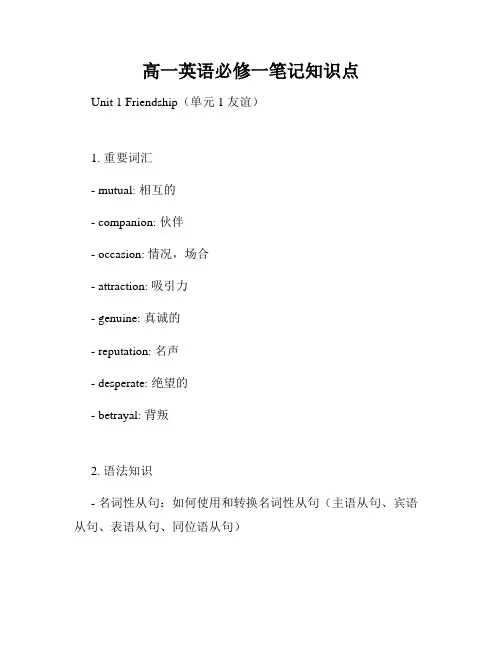
高一英语必修一笔记知识点Unit 1 Friendship(单元1 友谊)1. 重要词汇- mutual: 相互的- companion: 伙伴- occasion: 情况,场合- attraction: 吸引力- genuine: 真诚的- reputation: 名声- desperate: 绝望的- betrayal: 背叛2. 语法知识- 名词性从句:如何使用和转换名词性从句(主语从句、宾语从句、表语从句、同位语从句)- 现在分词和过去分词作定语:如何正确使用现在分词和过去分词修饰名词3. 阅读技巧- 掌握快速阅读的技巧:扫读和略读- 深度阅读:如何通过反复阅读和思考理解文章的主旨和细节- 阅读策略:找关键词,推测词义,推断作者意图Unit 2 English around the World(单元2 世界英语)1. 重要词汇- variation: 变化- geographic: 地理的- multinational: 跨国的- desperate: 绝望的- approximately: 大约- previously: 以前- interact: 相互作用- eventually: 最终2. 语法知识- 特殊疑问句和一般疑问句:如何正确使用特殊疑问词进行提问- 直接引语和间接引语:如何转换直接引语为间接引语3. 阅读技巧- 掌握速读技巧,快速筛选文章信息- 认识并理解全文结构,找到主题句和关键信息- 学会扩展阅读,寻找额外的相关资料Unit 3 Travel Journal(单元3 旅行日记)1. 重要词汇- fascinating: 迷人的- voyage: 航行- monument: 纪念碑- landscape: 风景- commercial: 商业的- luxury: 奢华的- picturesque: 如画的- spontaneous: 自发的2. 语法知识- 过去完成时:如何正确运用过去完成时表达在过去某一时间或事件之前已经发生的动作或状态- 感叹句:如何使用感叹句表达惊喜、赞叹等情绪3. 阅读技巧- 细节理解:通过细读寻找文章中的具体细节- 推理推断:通过合理推理理解作者的意图和观点- 背景知识:了解相关文化和地理背景知识以更好地理解文章Unit 4 Making a Difference(单元4 影响力)1. 重要词汇- charity: 慈善- inspiration: 启发- accomplish: 完成- campaign: 运动- poverty: 贫困- injustice: 不公正- optimistic: 乐观的- realistic: 现实的2. 语法知识- 条件句:如何正确使用各种条件句表达不同类型的条件和可能性- 间接引语的虚拟语气:如何转换间接引语中的动词时态和情态动词3. 阅读技巧- 掌握速读技巧,迅速寻找关键信息- 理解文章结构,分析段落之间的逻辑关系- 通过读者视角评价文章,表达个人观点以上为《高一英语必修一》的笔记知识点。
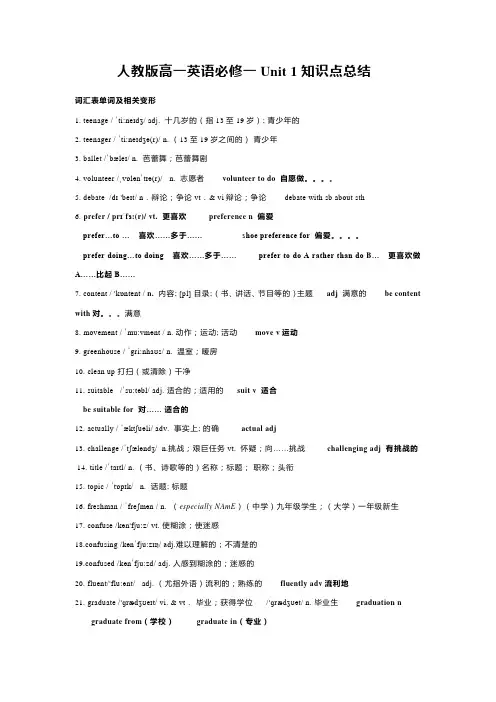
人教版高一英语必修一Unit 1知识点总结词汇表单词及相关变形1. teenage / ˈti:neɪdʒ/ adj. 十几岁的(指13至19岁); 青少年的2. teenager / ˈti:neɪdʒə(r)/ n. (13至19岁之间的)青少年3. ballet /ˈbæleɪ/ n. 芭蕾舞;芭蕾舞剧4. volunteer /ˌvɒlənˈtɪə(r)/ n. 志愿者volunteer to do 自愿做。
5. debate /dɪ 'beɪt/ n.辩论;争论vt.& vi辩论;争论debate with sb about sth6. prefer / prɪˈfɜ:(r)/ vt. 更喜欢preference n 偏爱prefer…to…喜欢……多于…… shoe preference for 偏爱。
prefer doing…to doing喜欢……多于…… prefer to do A rather than do B…更喜欢做A……比起B……7. content / 'kɒntent / n.内容; [pl] 目录; (书、讲话、节目等的)主题adj 满意的be content with对。
满意8. movement / ˈmu:vmənt / n. 动作;运动; 活动move v运动9. greenhouse / ˈgri:nhaʊs/ n. 温室;暖房10. clean up 打扫(或清除)干净11. suitable /ˈsu:təbl/ adj. 适合的;适用的suit v 适合be suitable for 对……适合的12. actually / ˈæktʃuəli/ adv. 事实上; 的确actual adj13. challenge /ˈtʃæləndʒ/ n.挑战;艰巨任务vt. 怀疑;向……挑战challenging adj 有挑战的14. title /ˈtaɪtl/ n. (书、诗歌等的)名称;标题;职称;头衔15. topic / ˈtɒpɪk/ n. 话题; 标题16. freshman / ˈfreʃmən / n. (especially NAmE)(中学)九年级学生;(大学)一年级新生17. confuse /kən'fju:z/ vt. 使糊涂;使迷惑18.confusing /kənˈfju:zɪŋ/ adj.难以理解的;不清楚的19.confused /kənˈfju:zd/ adj. 人感到糊涂的;迷惑的20. fluent/'flu:ənt/ adj. (尤指外语)流利的;熟练的fluently adv流利地21. graduate /'ɡrædʒʊeɪt/ vi. & vt.毕业;获得学位/'ɡrædʒʊət/ n. 毕业生graduation ngraduate from(学校)graduate in(专业)22.recommend /ˌrekəˈmend/ vt. 建议;推荐;介绍recommend sb to do 建议某人做。
高中英语必修一语法汇总Unit 1 短语短语或词组是具有一定意义但不构成句子或从句的一组词。
一、名词短语(NP)名词短语是指以一个名词为中心构成的短语。
(1)These ideas may seem strange to you.作主语(2)Welove our great motherland very much.作宾语(3)Theman wearing a black coat is our teacher.作表语(4)Those beautiful flowers come from Yun’nan.作主语(5)Weelected him monitor of our class.作宾语补足语[归纳总结](1)名词短语在句中作名词用,一般用作主语、宾语、表语、宾语补足语等。
(2)名词短语由“(限定词)+(数词、形容词、形容词短语、描述性名词)+名词+(介词短语)”组成。
[名师提醒]限定词包括冠词(a,an,the)、指示代词(this,that,these,those等)、物主代词(my,your,his,her,our,their等)和不定代词(some,no,neither,both等)。
[巩固内化1]指出黑体部分所作的成分①He got threegold medals at the 23rd Olympic Games.作宾语②The tall building was built last year.作主语③This is avery interesting book.作表语④We made him capital of our team.作宾补二、形容词短语(AdjP)形容词短语是指以一个形容词为中心构成的短语,在句子中的功能相当于形容词。
(1)Theair today is nice and clean.作表语(2)Sheis a girl lively and lovely.作定语(3)Hefound the film very interesting.作宾语补足语[归纳总结](1)形容词短语在句中作形容词用,可以修饰名词或代词,作定语,还可用作表语或者宾语补足语等。
高中英语人教版必修一英语单词用法和例句UNIT 1TEENAGE LIFEteenage用法:形容词,表示“青少年的”、“十几岁的”。
1. Many teenage students enjoy participating in after-school activities.许多青少年学生喜欢参加课外活动。
2. The teenage years are a time of significant growth and change.青少年时期是一个重要的成长和变化阶段。
3. The community center offers special programs for teenage members.社区中心为青少年会员提供特别项目。
4. Teenage drivers must be extra cautious on the road due to their limited experience.由于经验有限,青少年司机在路上必须格外小心。
5. Parents often find it challenging to communicate with their teenage children.父母通常会发现与青少年子女沟通很有挑战性。
teenager用法:名词,表示“青少年”、“十几岁的人”。
1. Most teenagers today have access to smartphones and the internet.如今大多数青少年都有智能手机和互联网。
2. The teenager next door volunteers at the local animal shelter every weekend.隔壁的那个青少年每个周末都在当地的动物收容所做志愿者。
3. The school organized a workshop to help teenagers deal with stress.学校组织了一个研讨会来帮助青少年应对压力。
高一英语必修一unit1知识点高中英语必修一Unit 1 知识点梳理一、词汇与短语1. 形容词与副词- 形容词用于描述名词的特征或属性,如:beautiful, interesting, difficult。
- 副词用来修饰动词、形容词或其他副词,表达方式、程度、时间等,如:quickly, usually, very。
2. 常用短语- as soon as possible:尽快地- as…as:和…一样- take place:发生- in order to:为了- be full of:充满- be strict with:对…严格- look forward to:期待二、语法点1. 比较级和最高级- 形容词和副词的比较级和最高级的构成规则,以及它们的基本用法。
- 比较级用于比较两者,最高级用于比较三者以上。
2. 现在完成时- 现在完成时的构成:助动词have/has + 过去分词。
- 现在完成时表示过去发生的动作对现在造成的影响或结果,或者从过去开始一直持续到现在的动作。
3. 一般现在时- 一般现在时的构成:主语 + 动词原形/第三人称单数形式。
- 一般现在时用于描述经常发生的动作、习惯、事实或状态。
三、阅读理解技巧1. 快速浏览(Skimming)- 快速浏览文章,抓住文章的主旨大意。
- 通过标题、图片、段落首句和尾句等信息进行判断。
2. 寻找主题句- 主题句通常位于段落的开头,概括了该段落的主要内容。
- 通过主题句可以更好地理解段落的核心思想。
3. 推理判断- 根据上下文线索,推断生词或难句的意思。
- 通过逻辑关系和文章结构进行推理。
四、写作技巧1. 开头引入- 使用引人入胜的开头,如引用名言、提出问题或描述一个场景。
- 开头应简洁明了,直接引入文章主题。
2. 正文论述- 按照逻辑顺序组织文章,每个段落只讨论一个中心点。
- 使用恰当的连接词,使文章结构清晰,逻辑性强。
3. 结尾总结- 总结文章的主要观点,重申文章的中心思想。
高一英语必修一课文笔记一、Unit 1 - Teenage Life。
(一)Reading: “Anne’s Best Friend”1. 重点单词。
- outdoors:adv. 在户外;在野外。
例如:We often go outdoors to play football.(我们经常去户外踢足球。
)- upset:adj. 心烦意乱的;不安的;vt. 使不安;使心烦。
如:She was upset about the bad news.(她对这个坏消息感到心烦。
)- ignore:vt. 不理睬;忽视。
例如:He ignored my advice and made a big mistake.(他忽视了我的建议,犯了一个大错误。
)- calm:vt. & vi.(使)平静;(使)镇定;adj. 平静的;镇静的;沉着的。
可以说:Calm down and tell me what happened.(冷静下来,告诉我发生了什么事。
)- concern:vt.(使)担忧;涉及;关系到;n. 担心;关注;(利害)关系。
例如:This matter concerns all of us.(这件事关系到我们所有人。
)- loose:adj. 松的;松开的。
如:She has long loose hair.(她有一头长长的、松散的头发。
)- series:n. 连续;系列。
常用搭配“a series of”,例如:A series of strange things happened last week.(上周发生了一系列奇怪的事情。
)2. 重点短语。
- add up:合计。
例如:Add up these numbers and see what the result is.(把这些数字加起来,看看结果是多少。
)- go through:经历;经受;仔细检查;完成。
如:He has gone through a lot of difficulties in his life.(他一生经历了许多困难。
高中英语必修一重点单词短语总结Unit1-4高中英语必修一重点单词短语总结Unit 1导语:高中英语重在积累,每个单元稳扎稳打才能步步为营。
下面是小编为大家整理的高中英语教材必修一的重点单词短语的总结,这篇是第一单元Unit1的。
Unit 1重点单词和短语1、add up合计add up to…共计, 总计达add…to把…加在里面2、upset sb. 某人不安 upset oneself about sth. 为某事而烦恼be upset at/about 因…而烦恼3、ignore sb./sth. 忽视,不理会 be ignorant of 对…无知,不了解ignorant adj 无知的,愚昧的 ignorance n 无知.愚昧4、calm vt.&vi. (使)平静;(使)镇定 calm down 镇静, 平静calm sb. down 使某人镇静 adj. 平静的;镇定的keep calm 保持镇静5、concern vt. 使担忧;涉及;关系到 n. 担心;关注with concern 关切地 show (no) concern for/about sb. 对某人(不)关心,concern oneself with/ in 参与,干涉 be concerned with 与…有关系be concerned about/ for sth. /that-clause 为…担心,挂念As far as… be concerned 就某某而言 concerning prep. 关于,有关6、walk the dog 遛狗7、go through 经历, 经受go through a hard time 经历了一段困难时期go through the baggage 检查行李go through the newspaper 浏览报纸go through lots of money 花了很多钱8、set down. 记下,放下set down the ideas on paper 把想法写在纸上set me down at the bus-stop 在车站让我下车9、a series of 一系列的, 一连串的a series of books 丛书 a series of stamps 一套邮票 a series of pictures 连环画10、on purpose 故意地= by design= deliberately by chance/accident= accidentallylie to sb. on purpose 故意向某人撒谎 on purpose to do sth. 为了…而特地go there on purpose to see sb. 特意到那里去看某人for/with the purpose of 为了…地目的11、in order to/ so as to (do sth.) 为了, 以……为目的so as to “为了”, 只能用在句中。
高一英语笔记必修一一、Unit 1 Friendship。
1. 重点单词。
- upset.- adj. 心烦意乱的;不安的;不适的。
例如:I was very upset to hear that he was ill.(听到他生病我很心烦。
)- vt. 使不安;使心烦。
例如:The bad news upset him.(这个坏消息使他心烦意乱。
)- ignore.- vt. 不理睬;忽视。
例如:He ignored my advice.(他忽视了我的建议。
)- calm.- vt. & vi. (使)平静;(使)镇定。
例如:Calm down and tell me what happened.(冷静下来告诉我发生了什么事。
)- adj. 平静的;镇静的;沉着的。
例如:Keep calm in the face of danger.(在危险面前保持镇静。
)- concern.- vt. (使)担忧;涉及;关系到。
例如:This matter concerns all of us.(这件事关系到我们所有人。
)- n. 担心;关注;(利害)关系。
例如:She showed great concern for my health.(她非常关心我的健康。
)- loose.- adj. 松的;松开的。
例如:I have a loose tooth.(我有一颗松动的牙齿。
)- go through.- 经历;经受。
例如:He has gone through a lot of difficulties in his life.(他一生中经历了许多困难。
)- 仔细检查;完成。
例如:Go through your homework carefully before you hand it in.(交作业之前仔细检查。
)- set down.- 记下;放下;登记。
例如:Set down your name and address here.(在这里记下你的名字和地址。
Unit one Friendship
词汇:
1.add up 合计;把…加起来
eg:Add up 3, 4 and 5 and you'll get 12.把3.4.5加起来得12.
Adding these figures up we can find the answer. 把这些数字加起来,我们就
可以找到答数
add up to 总计达;意味着
eg:The bills add up to exactly $100. 这些帐单加起来正好一百元
These evidence really adds up to that he didn't murder the man.这些证据实际上意味着他没杀人
2.upset
adj.心烦意乱的,不安的,不适的
eg:She got upset when she heard this news.听到这个消息她感到不安。
There is no point getting upset about it.犯不着为此烦恼.
vt.使不安,使心烦
eg:The news upset him a lot.这个消息让他很不安。
be upset by sth 被某事困扰
upset oneself about sth 对某事感到不安
3. ignore vt. 不理睬;忽视
eg:You will ignore the bell and go somewhere quiet to calm your friend down,你会不顾上课铃而去一个安静的地方让你的朋友安静下来
ignorant:adj.没有学识的,无知的 ignorance:n.无知
ignore ,neglect,overlook的区别:
ignore:通常指有意不顾或不理会显而易见的事物
neglect:侧重指粗心与疏忽
overlook:指因匆忙而疏忽或视而不见
eg:She saw him coming but she ignored him. 她看见他走过来, 但装做没看到他
He neglected to make repairs in his house.他忘记了修理房子.
The mother overlooked her little boy's bad behavior.那位母亲忽视了她的小儿子的不良行为
3.calm vt/vi.(使)平静;(使)镇定 adj:平静的
eg:No one expected that he was so calm when he heard the bad news. 没人料到他听到这个坏消息还这么平静
Calm yourself. You should not be so excited.请镇静,你不该这么激动。
calm(…) down (使)平静;(使)镇定
eg:I told myself to calm down. 我告诉自己要冷静。
4.have got to 必须;不得不常可以与have to 互换
eg:Have you got to go now?你非得现在走吗?
5.concern vt. (使)担忧;涉及;关系到 n. 担心;关注;(利害)关系
eg:This discussion concerns your brother.这个讨论与你兄弟有关
There is no concern of mine. 这不关我的事
be concerned about 关心,挂念
be concerned at/over sth 为某事忧虑
be concerned in sth 与…有关;参与;牵涉到
6. go through 详细检查;通过,审查,完成;遭受,经历
eg:The country has gone through too many wars.这个国家经历了太多战争。
The new law did not go through.新法案未能通过。
与go 有关的短语:
go back 回去;回顾 go by 从(…)旁边经过;(时间,机会等)过去
go down 下落,降低 go up 上升,上涨,兴建
go into (1) 到达,进入,从事,参加(2)调查,研究,弄清楚
go in for 参加(考试、比赛等);从事;(3) 爱好,喜欢
go out 1) 出去 2)出国,远行 3)熄灭
go over (1) 复习、温习、演习 2)检查,查看
7.set down 记下;放下;登记
eg:I don’t want to set down a series of facts in a diary as most people do.我不愿像大多数人那样在日记中记流水账。
与set 有关的短语:
set about 开始;着手 set off 出发, 动身使爆炸, 点燃, 发射使(某人)开始做, 使发火
set out 出发, 开始;陈述;阐明, 提出(理由) 摆出, 陈列, 布置
set to 认真干起来,大干起来 set up 竖起,建起
8.on purpose 故意(地);有意(地)
purposely (比较正式)故意地
9.in order to do sth 为了做某事可以放在句首,句中;可以与in order that 从句
互换
so as to do sth 为了做某事一般放在句中可以与so that 从句互换
10.face to face 面对面
face-to-face 面对面的
11.no longer=not any longer 不再…
no more=not any more 不再…
二者区别:no longer着重表示时间的不再延续,意为"如今不再"。
no more着重表示数量或程度的减少,意为"再也没有更多(大)的数量(程度)"。
no longer修饰延续性动词,如teach, live, work等,表示动作不再延续;no more修饰非延续性动词,如come, go , make (the same mistake)等,表示动作不再次发生。
12. settle vi安居,停留vt.使定居;安排;解决
eg:He settled his child in a corner of the compartment.他把孩子安顿在车厢的一个角落里.
The family has settled in Canada.这家人已经在加拿大定居。
phrases: settle down 1)(使)停止讲话,(使)安静下来;2)安顿,定居;3)开始专心于(活动、工作等),着手认真做(某事)[+to] settle for (勉强)接受,(将就着)同意
13.suffer v 遭受,忍受;经历
suffer from 遭受,患病 suffer for 因…而吃苦头
eg:Do you often suffer from headaches?你常头痛吗?
You will suffer for it if you drink up all the beer.如果喝完这所有的啤酒你会因此难受的。
14.get/be tired of 对…厌烦
15.pack up 将…包装
pack away将…收起来
eg:Please pack away the picnic things. 请把野餐用的东西收起来
16.
17.get along/on with 与…相处;进展
get along/on well/nicely/badly with 与…相处得好/不好;进展顺利/不顺利18.fall in love with sb与…相爱,爱上…
be in love with 与…相爱,爱着…
前者强调动作,后者强调状态
19.disagree vi 不同意
disagree with sth 不同意某事
disagree with sb (…)使某人身体不适,对某人有影响
disagree about/on 对观点不赞同,有分歧
eg:We disagree on that plan.我们对那个计划有分歧
Seafood always disagrees with me.我吃海鲜总不舒服
20.join in 参加;加入(某活动)=take part in
join 参加;加入(群体,政党,组织等)
eg:When did you join the Party? 你什么时候入党的?
May I join you for dinner?我能和你们共进晚餐吗?
Would you like to join in the English contest?你想参加英语竞赛吗?
语法:
1.介词with+宾语+宾语补足语。